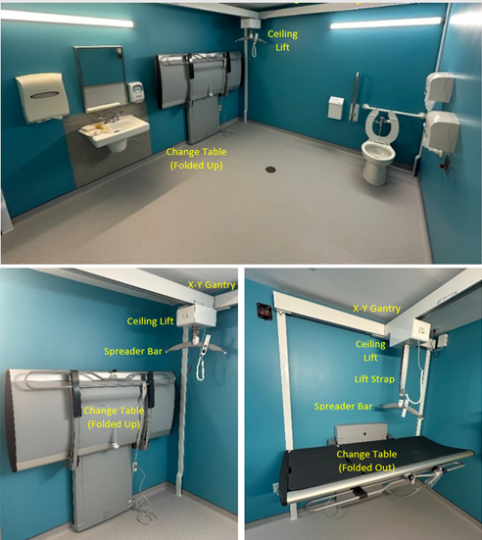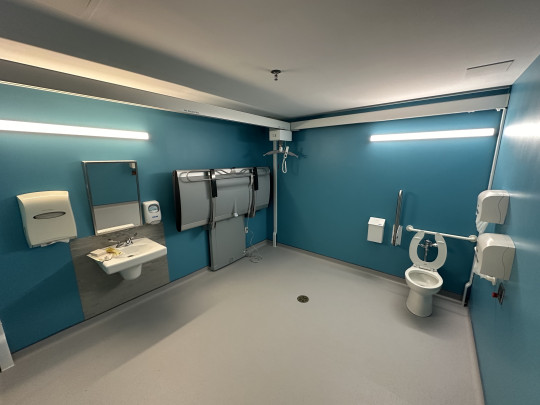Barrier-free access to washrooms transcends mere convenience; it is a fundamental human right that upholds individual dignity. The ability to use a bathroom independently, without needing to seek permission, is vital for maintaining self-respect and autonomy. In a facility dedicated to serving the Maritime population, we believe that all individuals, regardless of age or ability, should have the right to choose and use restrooms in a private and dignified manner.
IWK Health's commitment to accessibility
IWK Health provides care to a diverse population of children, youth, and families. Guided by our values of making things better and fostering a sense of belonging, we strive to create an accessible environment for all. This is in part done by acknowledging biases and actively reducing barriers, while embracing our responsibility to co-create spaces where everyone can thrive.
Recent enhancements include the introduction of two fully accessible washrooms on the main floor, designed to eliminate barriers and promote dignity for all users. These washrooms are equipped with full-size change tables and innovative gantry lift systems, facilitating seamless transfers for individuals with mobility challenges.
A collaborative approach to design
We recognize that effective design requires diverse perspectives; no single individual possesses all the insights necessary for creating truly inclusive spaces.
At IWK Health, we prioritize accessibility from the very beginning of every project. Each initiative undergoes a thorough review by the Accessibility Action Group (AAC), a multi-disciplinary team that includes members with lived experience and those holding Rick Hansen Foundation Accessibility Certification. This group not only ensures accessibility standards are met but also conducts on-site evaluations of completed projects, identifying opportunities for future enhancements.
Fostering an atmosphere of curiosity and continuous learning
This project’s impact goes beyond just improving physical accessibility. It has ignited ongoing conversations about disability, inclusion, and accessibility within our organization. These discussions are influencing our hiring practices and inspiring dialogue about future opportunities to enhance accessibility across all operational practices. The tangible changes made at IWK Health are sparking broader discussions about universal design, challenging us to envision new possibilities for accessibility in our facility.

Features of the new washrooms
1. Two Accessible Bathrooms: The addition of two washrooms reduces waiting times for users and provides redundancy in case one is out of service.
2. User-Friendly Gantry Systems: The gantry lift systems operate without locks, ensuring that no key is needed for access. It charges continuously, preventing battery depletion regardless of its position
3. Bariatric Change Tables: Full-sized change tables selected to maximize capacity while minimizing pinch hazard risk associated with height adjustments.
4. Colour Selection: Careful selection of paint and flooring provides visual contrast to enhance usability for individuals with vision impairments.
5. Emergency Features: An emergency call button alerts Protection Services ensuring quick access in emergencies.
6. Accessibility in Design: The lock system utilizes swipe/button activation to eliminate the need for gripping and twisting, making it easier for users with limited hand mobility.
7. Angled Mirrors and Paddle Taps: Mirrors are designed for use from a sitting position, and paddle taps ensure warm water is readily available for handwashing and cleanup.
Leading the charge toward a more just and inclusive community
As a provider of some of the most complex levels of care in our region, we advocate strongly for the health of families and position ourselves as a global leader in research and knowledge sharing. As we approach 2030, IWK Health remains steadfast in our commitment to ensuring barrier-free access across all aspects of the built environment, education, employment, goods and services, information and communications, and transportation services. Institutions like IWK Health aspire to lead the charge toward a more just and inclusive community.
